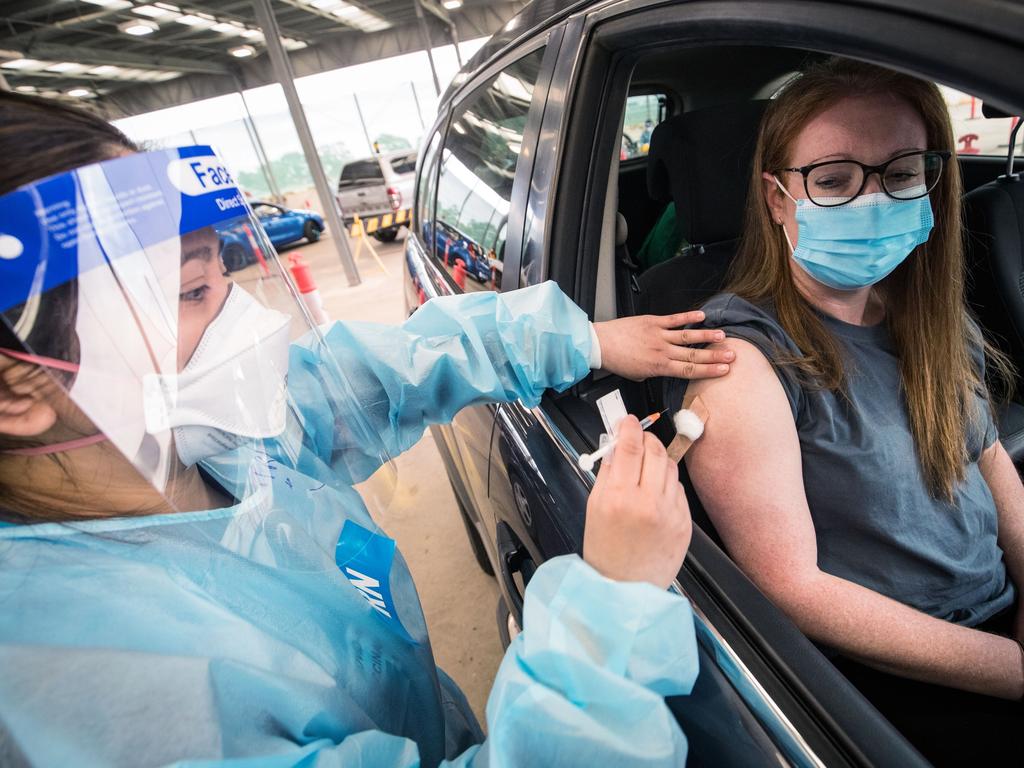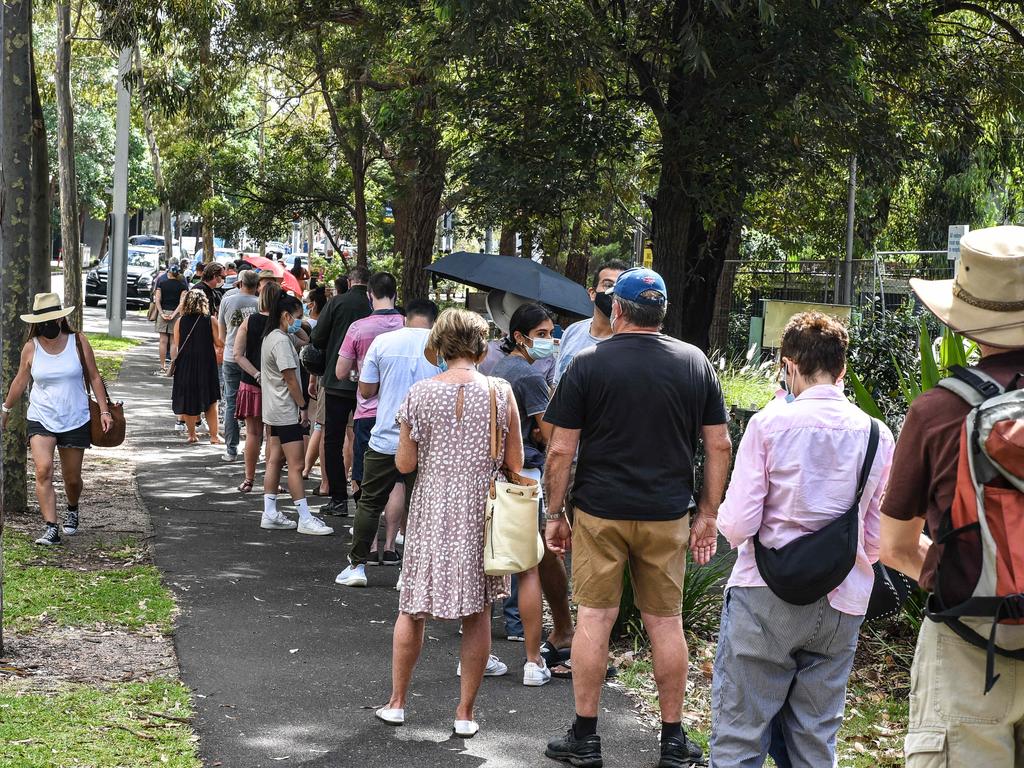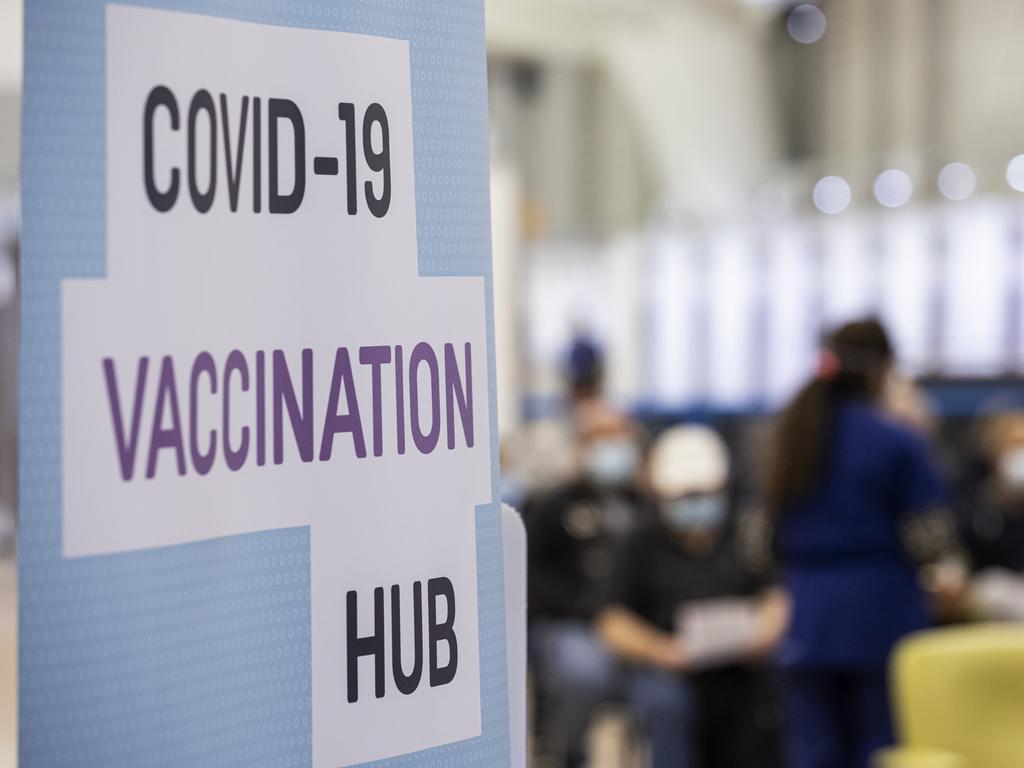Payouts begin under Australia’s vaccine injury claims scheme
Australia has begun paying out compensation for adverse reactions to Covid-19 jabs, but there’s a harsh reality for those seeking to apply.
Health
Don't miss out on the headlines from Health. Followed categories will be added to My News.
EXCLUSIVE
Australia has begun paying out compensation for adverse reactions to Covid-19 vaccines – but lower-than-expected take-up shows the scheme is intentionally “complex” and narrowly targeted, one legal expert says.
Health Department figures show less than one-tenth of the more than 10,000 people who registered interest with the federal government’s no-fault indemnity scheme prior to its launch in December have so far submitted claims.
The Covid-19 vaccine claims scheme allows people to claim a one-off payment ranging from $1000 to $20,000 for lost wages or other expenses if they suffer a bad reaction to a vaccine, provided they meet certain conditions including having spent at least one night in hospital.
As of February 9, Services Australia has received 861 claims – including death claims – under the scheme and “one claim has been paid” but 11 have already been withdrawn, a Health Department spokesman told news.com.au.
Of the 849 claims that “remain under consideration”, 225 are waiting further information from applicants.
The Health Department declined to provide a more detailed breakdown of the types of claims received, including the number of death claims, and the dollar amounts.
The figures provided suggest total possible payouts from claims to date ranging anywhere from $850,000 up to $17 million.
“With the indemnity scheme having only been opened for a short period of time, information on eligible claims and payment amounts is still being assessed,” the spokesman said.
“The assessment process can be complex, and claims may also be reviewed independently by medical and other appropriately qualified experts. In many cases, Services Australia has had to seek additional information from applicants in order to further progress consideration of their application. In other cases, applications have also been withdrawn.”
He added, “If found eligible, applicants will be given up to six months to accept an offer of compensation, therefore finalisation of claims may also take some time.”
Stream the latest health news with Flash. Stay up to date with 25+ global & local news channels. New to Flash? Try 14 days free now>

Under the scheme, claimants must meet three criteria to be eligible for compensation.
First, they must have suffered a recognised clinical condition or administration-related injury “most likely as a result of receiving the Covid-19 vaccine”.
Second, they must have received inpatient hospital treatment.
And third, they must meet the threshold of at least $1000 in losses, such as out-of-pocket medical costs or lost income.
The threshold was lowered from $5000 to $1000 in November, after pressure from vaccine sceptic Liberal Senator Gerard Rennick.
The scheme covers clinical conditions that are diagnosed by a treating doctor and are included in the product information document for the specific vaccine.
Those include anaphylactic reaction, thrombosis with thrombocytopenia syndrome (TTS), myocarditis, pericarditis, capillary leak syndrome, demyelinating disorders including Guillain Barre Syndrome (GBS), and thrombocytopenia, including immune thrombocytopenia.
Administration-related injuries covered by the scheme include shoulder injury or other moderate to significant administration injury – not including psychological distress such as shock – that gives rise to permanent impairment or the need for an extended period of medical treatment.
Shine Lawyers head of medical negligence Clare Eves said it was “disappointing” but not surprising that only 861 people out of the 10,000 had so far made a claim.
The law firm says it has received 347 inquiries regarding vaccine-related complications.

Ms Eves said the system the government had set up was “very complicated and very hard to navigate, particularly if you’re suffering an adverse health effect”.
“I can understand people are not going to be able to navigate the scheme, it’s not very easy for a layperson to understand and the burden of proof is all on them to gather all the evidence,” she said.
“When you look at the criteria involved in making a claim and the process somebody has got to follow, it’s not an easy one and it’s quite a niche situation that somebody has to be in to be able to make a claim. We’ve had a lot of people inquiring who maybe haven’t had a clinical diagnosis but have some of the symptoms or criteria, and have had a lot of ongoing health issues.”
Rather than setting up an easy-to-access system as a “good faith gesture” to encourage widespread vaccination by saying “we’re going to look after you”, Ms Eves said the government had instead “made it a little bit like the burden of running a civil law medical negligence claim”.
“But these people don’t have the benefit of legal experts, they’re relying on medical providers to fill out the forms,” she said.
Ms Eves said she had heard from clients that there was often resistance from doctors to link their symptoms to the vaccine.
“It’s quite hard to say that there is that causal link – they know how they felt before (the vaccine) and their health history, but you need that medical provider to support you,” she said.
As of February 6, Australia’s medicines regulator has received more than 108,000 total reports of adverse reactions to Covid-19 vaccines, from nearly 51.2 million total doses administered.
The Therapeutic Goods Administration has confirmed 11 deaths linked to vaccination – all after AstraZeneca – from 762 reports “received and reviewed”.
No deaths have been officially linked to Pfizer or Moderna in Australia, but health authorities in New Zealand have so far confirmed two deaths after Pfizer.

In total, there have been 172 cases of TTS, also known as blood clots with low blood platelets, linked to AstraZeneca in Australia.
Myocarditis and pericarditis, inflammatory heart conditions linked to the Pfizer and Moderna mRNA vaccines, are reported in about 1-2 and 2-3 out of every 100,000 people, respectively, but are more common in young men and boys.
There have been 496 likely cases of myocarditis and 863 likely cases of pericarditis, according to the TGA’s most recent safety report.
Some have previously raised concerns that the eligibility requirements for the vaccine claims scheme are too strict, as many adverse reactions can cause disruption to everyday life without rising to the level of overnight hospitalisation.
Under the guidelines, the hospitalisation requirement may be waived in certain circumstances.
Speaking to 7 News Sydney in December, Matty John said he was off work for 10 weeks after being diagnosed with severe pericarditis from the Pfizer vaccine.
He was admitted to hospital twice, but because he never stayed the night, he is not eligible for the scheme.
“It is a little bit frustrating, (I’m) out of pocket a fair bit,” he said. “But in saying that too, it is what it is, and that’s life.”
Others have suffered reactions they believe are linked to the vaccine, but which are not officially recognised either by the drug makers, doctors or health regulators.
Last year, Melbourne mechanic Peter Lee suffered a stroke two days after his second Pfizer shot.
At the time, the Health Department said it was “aware” of a large study from the UK in August that did find an increased risk of stroke associated with Pfizer – but to date the TGA has not acknowledged stroke as a potential side effect.
“Large-scale vaccination means that some people will experience a new illness within a few days or weeks of vaccination,” a Health Department spokeswoman said.
“These events are often coincidental, rather than being caused by the vaccine, therefore any attempts to link the two based on a temporal association alone is misleading.”
Originally published as Payouts begin under Australia’s vaccine injury claims scheme









